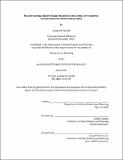Mainstreaming climate change adaptation into urban development : lessons from two South African cities
Author(s)
Farrell, Leanne A. (Leanne Andrea)
DownloadFull printable version (9.818Mb)
Other Contributors
Massachusetts Institute of Technology. Dept. of Urban Studies and Planning.
Advisor
JoAnn Carmin.
Terms of use
Metadata
Show full item recordAbstract
There is a risk that urban climate change adaptation planning - often led by city environmental agencies - will remain isolated from ongoing city decision-making processes, and thus irrelevant, unless adaptation is mainstreamed into municipal line functions' existing activities and planning processes. Yet little empirical research exists showing what the adaptation "mainstreaming" process actually looks like for a city government department. This thesis addresses this gap, and identifies key drivers, limiting factors, and implications of adaptation mainstreaming within municipal service departments. Specifically, I analyze progress toward climate adaptation mainstreaming by the housing and stormwater management departments in Cape Town and Durban, South Africa: two cities that are widely considered adaptation frontrunners in the Global South. The experiences of the departments analyzed lead to several conclusions about the adaptation mainstreaming process for departments faced with pressing short-term service delivery challenges and capacity constraints. Foremost, the process encompasses, and requires, both substantive and conceptual elements. Substantively, departments start with complying with mandates and accommodating requests from other departments that advance adaptation. Gradually, they move to more deeply internalize these and other push factors, initiating actions to "climate proof' core activities and processes. Culminating the process, they eventually see climate change as a reason to more heavily collaborate and engage external actors around managing climate risks. Substantive mainstreaming progress, meanwhile, both depends on and advances a department's conceptual embedding of the adaptation agenda. Several enabling factors advance the process, prominently including access to additional funding and support to supplement scarce and inflexible resources. Progress is also influenced by the innate longevity of a department's planning horizon, its decisionmaking autonomy vis-a-vis higher levels of government, and its degree of regulatory vs. serviceprovision focus, among other pre-existing departmental qualities. (cont.) Tracing the adaptation mainstreaming process further suggests a few key implications for donors and others looking to support cities in their climate adaptation efforts. Firstly, the process of integrating adaptation into municipal line function core operations and decision making processes is undeniably challenging and slow. Thus, in light of scarce resources and other more seemingly pressing agendas, a department is unlikely to begin substantively embedding adaptation unless first seeing the agenda as conceptually intertwined with core functions and immediately actionable. Secondly, although this research did not control for the presence of a city-wide climate adaptation office, the experience of the featured departments suggests that such an office can play a critical role in pushing and supporting departments to mainstream adaptation. Such offices can identify and channel additional sources of funds for adaptation, educate departments about climate change risks, and keep the adaptation agenda politically visible. Thirdly, the way in which adaptation is framed as an agenda within a city has repercussions for departmental buy-in. For example, an environmental problem framing may not be the most advantageous for departments such as housing who historically see environmental agendas as external to, or even in conflict with, their core mandates. Meanwhile, other departments may be reluctant to respond to push factors or support from city-wide climate offices if they perceive adaptation as working against fulfillment of some core responsibilities, even if enhancing others.
Description
Thesis (M.C.P.)--Massachusetts Institute of Technology, Dept. of Urban Studies and Planning, 2010. This electronic version was submitted by the student author. The certified thesis is available in the Institute Archives and Special Collections. Cataloged from student submitted PDF version of thesis. Includes bibliographical references (p. 84-89).
Date issued
2010Department
Massachusetts Institute of Technology. Department of Urban Studies and PlanningPublisher
Massachusetts Institute of Technology
Keywords
Urban Studies and Planning.